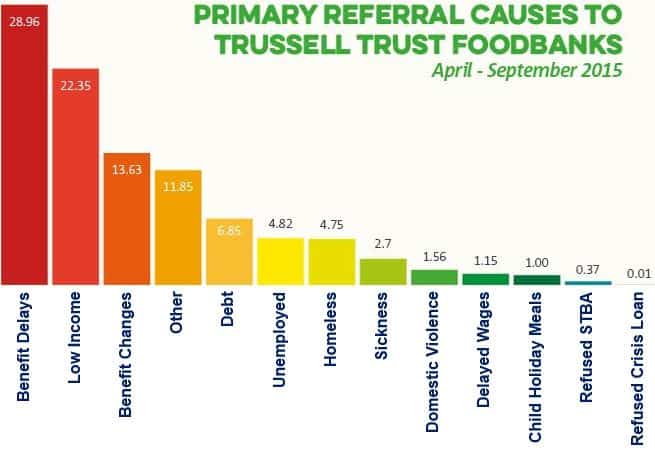The ‘scandal of hunger’ in Britain, where children go for days without a meal, should be treated as an emergency, with the equivalent of a Cobra committee which is convened in response to terrorist attacks or serious threats to the nation, says a Commons Committee.
Labour MP Frank Field, chairman of the Committee, along with the Archbishop of Canterbury, propose the introduction of a tax on sugary drinks to finance projects during school holidays.
The report – ‘Feeding Britain’ – was produced by MPs and Peers in the All-Party Parliamentary Group on Hunger.
The Government welcomed the report and said it will look carefully at all the recommendations.
 There are many reasons why people may need help at foodbanks. (Image: www.trusselltrust.org)
There are many reasons why people may need help at foodbanks. (Image: www.trusselltrust.org)
Mr. Field said Prime Minister David Cameron and his Cabinet treat the “scandal of hunger as a boil of no significance.”
Armies of people who are hungry
Mr. Field, who was given the role of ‘poverty czar’ in David Cameron’s coalition government after Labour’s 2010 election defeat, said regarding the problem of hunger in the United Kingdom:
“We are in this extraordinary position of, despite the huge economic difficulties we have had, we are a rich nation that throws away and pays people to burn edible food and we have armies and armies of people who are hungry.”
“We are so precious that we burn food for fear of infecting anybody although the food is perfectly reasonable to eat, and we have got these armies of people who are hungry.”
“What is the point of being in government unless you are really going to do something about that? Each night we and the prime minister go to bed knowing that kids have gone to bed hungry.”
Don’t let supermarkets throw away food
The report also urges the government to push harder for prompt payments of benefits, for ministers to ban supermarkets and their suppliers from literally throwing away food, and for budget advisers to work at food banks.
The group said the total number of people who have to rely on food parcels in order to get enough to eat remains at its highest levels since the Second World War. It added, however, that some progress has been made.
The Most Reverend Justin Welby, the Archbishop of Canterbury, described as ‘shocking’ the amount of food that is wasted in the UK, as well as pointless delays in the country’s benefits system.
Between April 2014 and March 2015, a total of 1.1 million emergency food parcels have been given to people in need in the UK, which is a 19% increase on the previous year.
In his foreword to the report, Archbishop Welby said:
“I remain saddened because there is clear evidence here that there are far too many people continuing to struggle to feed themselves and their families in Britain in the 21st century.”
With zero hour contracts increasing by 2.4% last year to 744,000, the report calls for ‘broad consultation’ on the issue. A network of ‘social supermarkets’ should be set up across the UK to provide affordable food, it added.
According to the report:
“The queue for help from Britain’s food banks tends to grow once the school bells ring to mark the beginning of the holidays. For those children who usually receive a daily free school meal during term time, these bells often usher in a period of going day after day without a substantial meal.”
The Trussell Trust says…
The Trussell Trust, a charity that co-ordinates the only nationwide network of food banks in the UK, said that benefit delays and changes are the biggest cause of foodbank use – they account for 43% of all referrals (29% benefit delay and 14% benefit changes), which is a slight reduction on 44% reported in 2014.
Low income, on the other hand, has increased slightly as a referral cause from 21% to 22%
The charity, which runs a network of 425 foodbanks across the country, described the numbers needing emergency food as ‘worryingly high’.
Adrian Curtis, UK Foodbank director, said:
“Latest foodbank figures are still at worryingly high levels. We look forward to the day that we can announce a decrease in numbers needing foodbanks, and we welcome the fact that latest national figures show a less dramatic rise.”
“Whilst we hope that this is a sign that economic recovery is giving more people access to secure work, several foodbanks are reporting that some agencies and charities who would normally refer people in crisis to foodbanks have been unable to do so because funding reductions have caused their services to be squeezed or closed.”
“We’re seeing that hunger remains a major issue for low income families and individuals. When the proposed changes to tax credits are implemented, we are concerned that more working families will not be able to make ends meet, and that we could see a substantial rise in foodbank use as a result. As a nation we need to learn more about the realities of life for people struggling on low incomes and make sure that no incomes are too low to live on.”
Video – Food Banks Scotland’s Hidden Hunger
In 2014, more than one million people were given emergency food in the UK. The Food Bank follows the stories of some people who get help from Scotland’s busiest food bank in Dundee. Charlie, for example, was a victim of a robbery and has no money to buy food. Billy, a single dad, is forced to get help from the food bank to feed his four-year-old son, after a long spell out of work.
